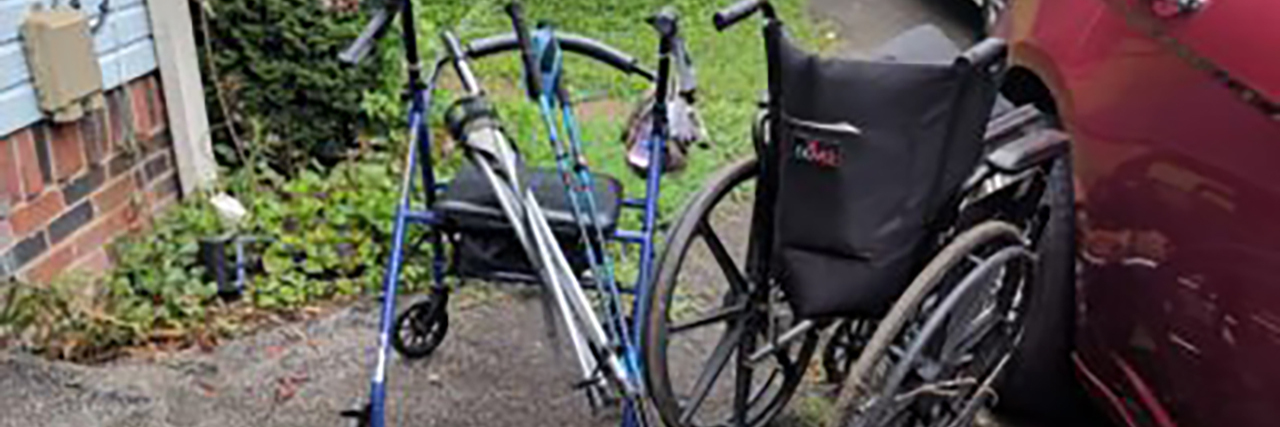When it was first suggested that I needed help walking, I shrugged it off in complete denial. I’d been walking dizzily for years, occasionally falling in the middle of the street or stumbling into friends and strangers. It wasn’t ideal, but I could handle it. I didn’t need any help. Dizziness, instability, and occasional falls come with my fibromyalgia and had been part of my life since high school. I was used to it.
But then my back pain got so bad that I found myself squirming and even collapsing when I had to wait in long lines. A few minutes standing and talking went from casual interaction to absolute agony. Walking long distances, which used to be my norm, became a real challenge. It got to the point where I had to admit that I needed help.
The strange paradox of assistive devices, like many other forms of help, is that we always seem to believe they’re great things, but for “other people.” I never thought of canes, walkers, and wheelchairs as things that came and went in people’s lives depending on the day and the activity. I thought some people always needed them and some people never did. I didn’t know that there was a hazy group in between, consisting of people who need wheelchairs on their worst days but can partake in short physical activities on their best days.
In grad school, I learned about something called imposter syndrome. The idea is that some students don’t believe they really deserve to be in grad school and are constantly worried about being “found out.” People with invisible chronic illnesses tend to have imposter syndrome as well. We worry that because our diseases are less obvious, we’re going to be called out as fake. We worry that if we use a wheelchair/walker/cane one day and not the next, someone will accuse us of not deserving whatever small amount of help we manage to get. We worry that we’re not trying hard enough, that if we just pushed through a little more we wouldn’t be as limited.
Every single day, people with invisible illnesses fight a battle that is hard to explain to others or even to understand ourselves. In addition to the pain, fatigue, confusion and vertigo, I have to deal with a constant stream of skeptics telling me things like “But you’re so young!” and “You don’t look sick!” On my worst days, writhing in pain on the floor or in my bed, a voice in the back of my head echoes those of my family and friends who have accused me of faking over the years. I wonder if I’m doing this to myself if I’m just not pushing through hard enough. But I’ve pushed through as hard as I can, and now it’s time to accept the help I need, in whatever form it comes in.
I felt embarrassed at first using assistive devices. I felt like I didn’t deserve them, or like I wasn’t trying hard enough not to need them. Having to tell people I needed a cane or a walker felt awkward and uncomfortable, because of my own biases and insecurities. But I found a way to lighten the mood and take ownership of my condition – I gave my assistive devices names.
I have a cane that folds out into a chair, which I call Chairman Cane, or The Chairman for short. Giving him a name and a persona made me feel more confident about using him, and now I don’t mind “introducing” him to people who ask about him. I have a pair of hiking poles I call my Adventure Sticks, and sometimes when I go out I use a rollator I call Rollatron. My wheelchair, though rarely used, is called The Chair-iot.
It sounds silly, but naming my assistive devices made them seem more in line with who I am and allowed me to integrate them easier into my life. Before Rollatron got her name, I often referred to her as “my thing” because I felt embarrassed to admit I needed a walker. Asking for “The Chairman” made me feel less awkward than asking for “my cane.” I had stereotypes playing in my head of walkers and canes being for the elderly or acutely injured, which I realize was completely unreasonable, and was something I had to battle in myself. But it doesn’t help that random strangers have actually yelled at me for using The Chairman and Rollatron, claiming that I don’t need them because I look so young and healthy.
No one should feel awkward or ashamed for needing help getting around, whether it’s consistent or not. People with less obvious illnesses shouldn’t be made to feel like they’re faking it because their needs vary from day to day. And people with disabilities of any type should feel confident moving around in the world in whatever way works best for them.
Coming up with nicknames for my assistive devices has helped me to personify them as allies and tools in my struggle with chronic illness rather than enemies or obstacles. It’s made me feel more confident using them and talking about them, and in asking for the help I need. It’s helped me be less self-conscious about using what I need to be able to participate more in the world, which is something that should be available to everybody.
Image belongs to the author.

